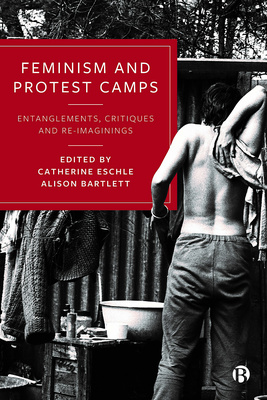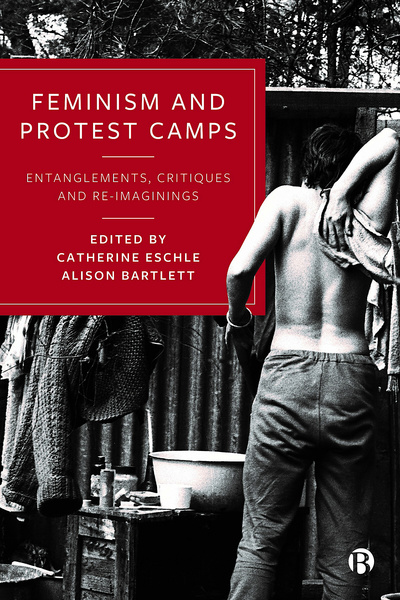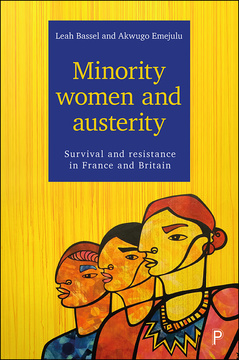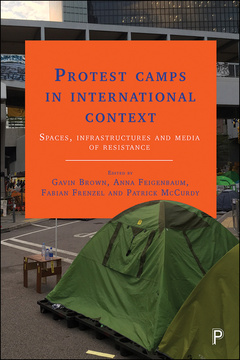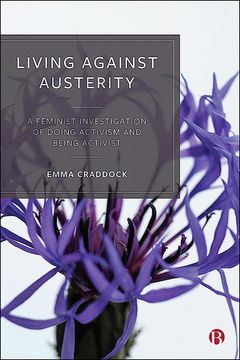Feminism and Protest Camps
Entanglements, Critiques and Re-Imaginings
Edited by Catherine Eschle and Alison Bartlett
Published
21 May 2024Page count
330 pagesISBN
978-1529220179Dimensions
234 x 156 mmImprint
Bristol University PressPublished
31 Jan 2023Page count
330 pagesISBN
978-1529220162Dimensions
234 x 156 mmImprint
Bristol University PressPublished
31 Jan 2023Page count
330 pagesISBN
978-1529220186Dimensions
234 x 156 mmImprint
Bristol University PressPublished
31 Jan 2023Page count
330 pagesISBN
978-1529220186Dimensions
234 x 156 mmImprint
Bristol University PressThis groundbreaking collection interrogates protest camps as sites of gendered politics and feminist activism.
Drawing on case studies that range from Cold War women-only peace camps to more recent mixed-gender examples from around the world, diverse contributors reflect on the recurrence of gendered, racialised and heteronormative structures in protest camps, and their potency and politics as feminist spaces.
While developing an intersectional analysis of the possibilities and limitations of protest camps, this book also tells new and inspiring stories of feminist organising and agency. It will appeal to feminist theorists and activists, as well as to social movement scholars.
"A smart and much-needed collection that takes seriously the feminist politics of encampment. This collection critically examines the feminist possibilities of occupation and how this work can be a portal to a new world or a cul de sac reproducing the worst of us." Akwugo Emejulu, University of Warwick
“I rarely see feminist scholarship on social movements comprehensively consider the settler colonial, cisheteronormative, and otherwise exclusionary politics of protest sites. So, it is refreshing, urgent, and thrilling to read Eschle and Bartlett's carefully curated book. This co-edited collection privileges an intersectional feminist interrogation of protest camps with significant focus on the world-building struggles and strategies of indigenous, Black, and various precariously positioned communities. Each chapter is theoretically robust and steeped in rich details that are both troubling and enlivening to read. It is also a very cohesive book, a hard feat indeed given the wide variety of the case studies and author positionalities, that asks us to constantly rethink not only feminist politics but also how we use feminist frameworks to understand protest and resistance. I cannot wait to assign this book to my students!” Meghana Nayak, Pace University
"Today when feminism is under attack everywhere, this book offers a rich and nuanced reminder of its vital and ongoing presence in contemporary women-only and mixed gender protest camps across several countries in the Global North and South. The authors’ explorations of protest camps as simultaneously sites of gendered politics - where inequalities of power and gendered divisions of labour and spatial location get reproduced and where historically racialized, gendered, and sexed bodies are vulnerable to violence - and of feminist activism where those politics are contested and reconfigured is both sobering and exciting. Just the kind of 'skepticism of the intellect and optimism of the will' demonstrated by the chants of 'Women, Life, Freedom' in Iran and elsewhere." Manisha Desai, University of Connecticut
"Over forty years since the Greenham Common Women’s Peace Camp was at its peak, and with protest camps now firmly established in the global repertoire of social movements, this collection is a timely and important intervention in the analysis of feminist political action. Ranging across the world and over time, the contributors provide vivid accounts of numerous instances in which women have formed communities of resistance outside conventional politics. This is a must-read book for everyone interested in contemporary feminism and methods of collective action." Sasha Roseneil, University of Sussex
"The first of its kind, this global collection brings together feminism and protest camps, looking at activist histories to help us reflect on today’s urgent questions—from aboriginal rights to climate change. Featuring both prominent feminist scholars and new researchers from around the world, the chapters examine creativity, care and what it means to organise, act and live collectively. This book is both a pleasure to read and a truly innovative and interdisciplinary text. Using methods ranging from interviews to ethnography, Feminism and Protest Camps reminds us of the importance of looking both at what is documented and what gets left out of the archives. In drawing together stories so often left untold, it brings powerful voices and practices of resistance into the canon of social movement history. Feminism and Protest Camps will be essential reading for feminists, social movement students, scholars and activists alike." Anna Feigenbaum, Bournemouth University
“Excavating diverse feminist engagements with peace and protest camps around the globe, this volume provides fascinating insights into the politics of memory and erasure, the politics of inclusion and exclusion, and the politics of language and knowledge production. It illuminates the arduous work of critique and social transformation and probing the history of and prospects for feminism and participatory democracy in the contemporary era.” Mary Hawkesworth, Rutgers University
Catherine Eschle is Senior Lecturer in the School of Government and Public Policy at the University of Strathclyde.
Alison Bartlett is Senior Honorary Research Fellow in the School of Humanities at the University of Western Australia.
1. Introduction: Feminism/Protest Camps - Catherine Eschle and Alison Bartlett
Part 1: Gendered Power and Identities in Protest Camps
2. Safe Spaces and Solidarity: Confronting Gendered Violence in the US Occupy Encampments - Celeste Montoya
3. The Pu’u We Planted: (Re)birthing Refuge at Mauna Kea - Māhealani Ahia and Kahala Johnson
4. ‘You Can’t Kill the Spirit’ (But You Can Try): Gendered Contestations and Contradictions at Menwith Hill Women’s Peace Camp - Finn Mackay
5. Women Activists, Gendered Power and Postfeminism in Taiwan’s ‘Sunflower Movement’ - Chia-Ling Yang
Part 2: Feminist Politics in and through Protest Camps
6. The Feminist Movement in Turkey and the Women of the Gezi Park Protests - Yeşim Arat
7. Feminism and Protest Camps in Spain: From the Indignados to Feminist Encampments - Emma Gómez Nicolau
8. ‘Why the Compost Toilets?’: Ecofeminist (Re)Generations at the HoriZone Ecovillage - Joan Haran
Part 3: Feminist Theorising and Protest Camps
9. Protest Camps as ‘Homeplace’? Social Reproduction in and against Neoliberal Capitalism - Catherine Eschle
10. Project Democracy in Protest Camps: Caring, the Commons and Feminist Democratic Theory - Anastasia Kavada
11. Feminised and Decolonising Reoccupations, Re-existencias and Escrevivências: Learning from Women’s Movement Collectives in Northeast Brazil - Sara C. Motta, Sandra Maria Gadelha de Carvalho, Claudiana Nogueira de Alcencar and Mila Nayane da Silva
Part 4: The Feminist Afterlives of Protest Camps
12. Feminism on Aboriginal Land: The 1983 Pine Gap Women’s Peace Camp, Central Australia - Alison Bartlett
13. Remembering an Eco/Feminist Peace Camp - Niamh Moore
14. US Occupy Encampments and Their Feminist Tensions: Archiving for Contemporary ‘Big-Tent’ Social Movements - Heather McKee Hurwitz and Anne Kumer
15. Greenham Women Everywhere: A Feminist Experiment in Recreating Experience and Shaping Collective Memory - Kate Kerrow, Rebecca Mordan, Vanessa Pini and Jill (Ray) Raymond, with Alison Bartlett and Catherine Eschle
16. Conclusion: Rethinking Protest Camps, Rethinking Feminism - Catherine Eschle and Alison Bartlett







